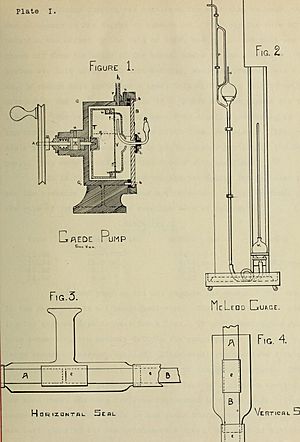Wolfgang Gaede facts for kids
Quick facts for kids
Wolfgang Gaede
|
|
|---|---|
| Born | 25 May 1878 |
| Died | 24 June 1945 (aged 67) |
| Known for | Diffusion pump |
| Awards | Elliott Cresson Medal, Duddell Medal and Prize |
| Scientific career | |
| Fields | Vacuum engineering |
| Institutions | University of Freiburg, Karlsruhe Institute of Technology |
Wolfgang Max Paul Gaede (born May 25, 1878 – died June 24, 1945) was a German physicist. He was a pioneer in the field of vacuum engineering. This means he was one of the first and most important people to develop ways to create and use spaces with very little air or gas inside, called a vacuum.
Contents
Life and Discoveries
Wolfgang Gaede was born in Lehe, which is part of Bremerhaven, Germany. His father was a colonel. In 1897, Wolfgang started studying medicine at the University of Freiburg. However, he soon decided that physics was more interesting and switched his studies.
In 1901, he earned his PhD, which is a high-level university degree. His research was about how the heat of metals changes with temperature. Later, he tried to study something called the Volta effect in a vacuum. But the vacuum pumps available at that time were not good enough. This challenge made Gaede very interested in improving vacuum technology.
Inventing Better Pumps
Because of his interest, Gaede invented a new type of pump called the rotating mercury pump. This pump could create a much better vacuum than before. He showed his invention to other scientists in 1905. In 1909, he completed another important research paper about how gases behave when they rub against surfaces.
In 1913, Gaede became a professor at the University of Freiburg. Over the next six years, he invented two more important vacuum pumps:
- The momentum transfer pump (also called a molecular pump).
- A mercury diffusion pump. This type of pump is still used today to create very high vacuums.
In 1919, Gaede moved to the Karlsruhe Institute of Technology. There, he continued his work as a professor of experimental physics. He researched many different areas, including:
- Making vacuum technology even better.
- Radio and communication technologies.
- Ways to get very pure hydrogen and mercury.
- How to protect buildings and equipment from lightning.
- How liquids move in a spinning ring.
Later Years and Challenges
In 1930, Gaede was chosen to be a member of the Academy of Sciences Leopoldina. This is a very respected group of scientists.
A few years later, in 1933 and 1934, some people made false accusations against Gaede. They claimed he had said negative things about the government at the time. Even though these claims were proven to be untrue, he had to retire from his job. Despite this difficult time, he still received the Werner von Siemens Ring in 1934, which is a major award for achievements in technology. He also received other international awards.
From 1906, Gaede had a special agreement with a company called Leybold GmbH. This agreement allowed him to keep doing his research in his own private laboratory, first in Karlsruhe and later in Munich. During this time, he invented the gas ballast principle, which made vacuum pumps even more effective. Wolfgang Gaede held almost 40 patents in Germany and many more in other countries for his inventions.
Wolfgang Gaede passed away in Munich in 1945. He was invited to return to the university in Karlsruhe after the war ended, but the message did not reach him in time.
Honours and Memorials
Wolfgang Gaede received many awards for his important work:
- The Elliott Cresson Medal from the Franklin Institute in Philadelphia in 1909.
- The Duddell Medal and Prize from the Physical Society of London in 1932.
His legacy is also remembered in other ways:
- A lecture hall at Karlsruhe University was named after him in 1969.
- A street on the university grounds in Karlsruhe was named Wolfgang-Gaede-Strasse in 1993.
- There is also a Gaedestraße in Cologne, near the Leybold Vacuum company.
The GAEDE Foundation, managed by the German Vacuum Society, gives an award called the Gaede Award to young scientists. This award is for excellent work in fields that use vacuum technology. The foundation also keeps an archive of Gaede's work at the Leybold GmbH headquarters in Cologne.
See also
 In Spanish: Wolfgang Gaede para niños
In Spanish: Wolfgang Gaede para niños
 | William M. Jackson |
 | Juan E. Gilbert |
 | Neil deGrasse Tyson |


